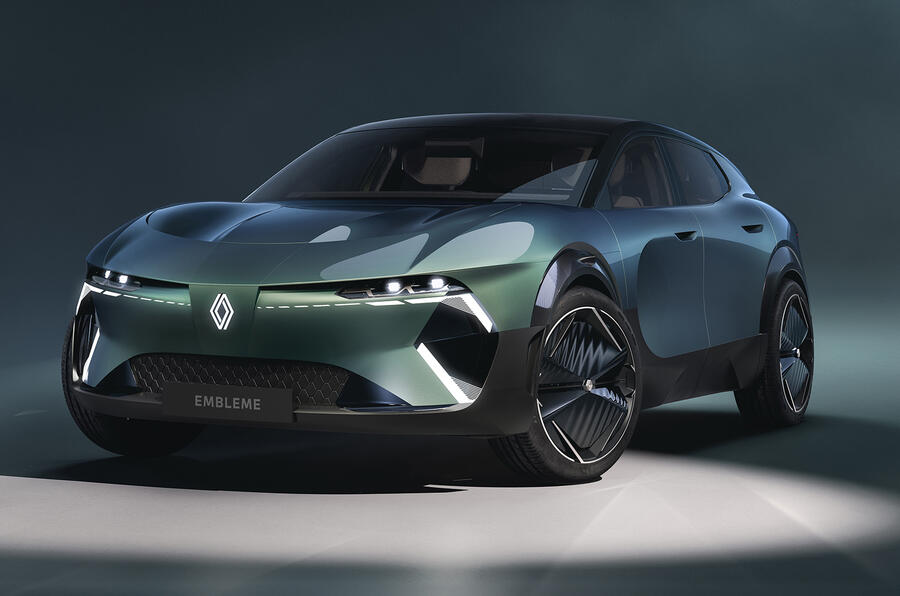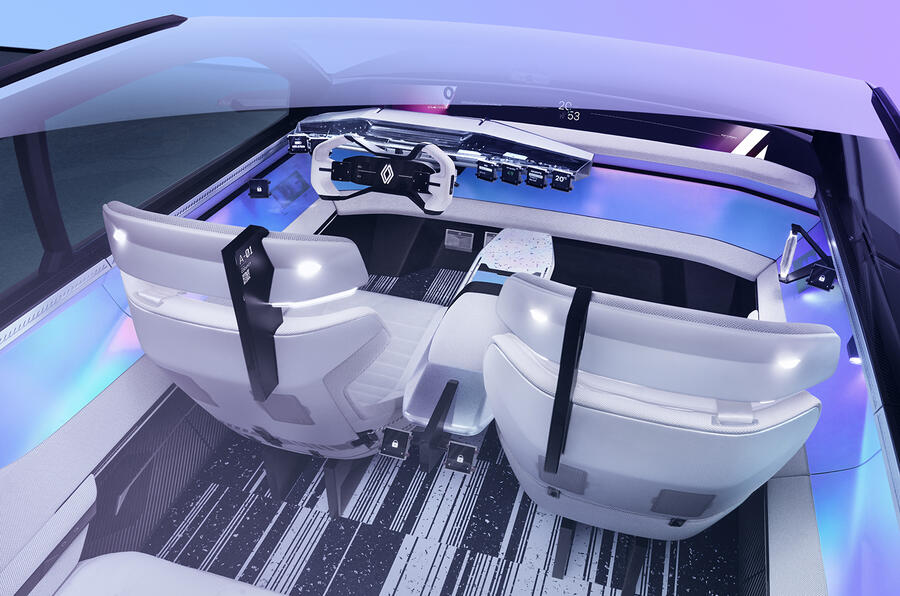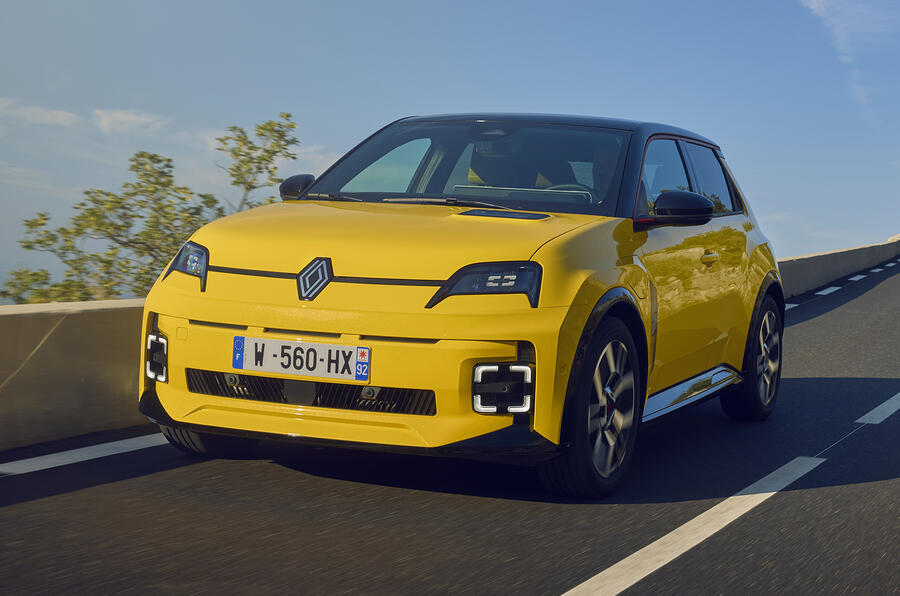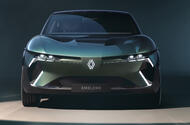Embleme concept hints at new design language
Renault design chief Gilles Vidal says next-gen EVs from 2028 will feature radical new bodystyles
The next-generation of Renault vehicles that will arrive starting in 2028 are set to eschew SUV design in favour of new body styles featuring “breakthrough concepts”, with new design language hinted at by the recent Embleme concept, according to the firm’s design chief.
The French firm recently confirmed that it would launch a “new generation” of EV from 2028 onwards. They will sit on a new platform hinted at by the Embleme concept shown at the Paris motor short, and which are claimed to offer radical advanced in efficiency and sustainability. But he also confirmed that the new Renault 5, 4 and Twingo models would retain their own distinctive designs in future.
When it comes to the design of future models, Renault design boss Gilles Vidal said that “the big question is how to do you reinvent the next step in terms of concepts [and] silhouettes? What do they stand for? What are they for?”
Vidal said that was being considered in response to “a lot of SUV bashing”, but noted that “people still want, and sometimes even need them. SUVs have replaced MPVs, more or less, and some people still buy them for practical reasons.
“It makes you wonder what should we do that’s less questionable in terms of heritage, and more efficient, and therefore deserves a new kind of shape?”
Vidal cited efforts to oppose SUVs in Paris, where authorities have introduced extra parking charges due to their size and weight. He noted: “there’s still a huge fight against SUVs on principal, but would you say the same thing about MPVs? They are the same weight, have the same engines, the same CO2 emissions. But no-one would ever criticise an MPV, a respectable family product. Who are we to criticise aggressive looking cars? It’s only a shape, you know, so can you critisise shapes and characters?”
Regardless, Vidal said that, especially because “people will still need big cars”, the question was “what character do you give to those products? And beyond that, what are the next things? It seems like we’ve seen it all. The world invented the Space and the Scenic, and big fat SUVs and them more respectable crossovers. Along with almost 140 years of automobile history it seems like we’ve seen it all – but surely there are new things to invent; new very meaningful concepts and silhouettes regarding society’s questions in today’s world.”
Embleme concept hints at future line-up
The Embleme concept takes the form of a bold coupe-SUV. While a production version of it will likely arrive in a few years, Renault design boss Gilles Vidal said the concept is also a more accurate representation of its future line-up than its recent models inspired by its heritage.
“The cars before the Embleme were maybe a bit misleading,” said Vidal, “because you see a 5, a 4, a Twingo. The 5 and 4 are retro-futuristic, and the Twingo never stopped [production] but we’re going back to the design cues of the first one. But that’s a big misleading because every design is a specific to one car. We’ve done three of those in a row, so people ask ‘is this a new Renault thing or what?’
“The Embleme is a better representation of what’s next for the brand globally in terms of design, and maybe new silhouettes, for the future: generous shapes, not too minimalistic, but simpler than what we did lately on Scenic.

“A lot of people in Europe are saying it’s a pity that estates and wagons are disappearing one by one, but for EVs having a low, streamlined, yet practical product is a very good idea. That’s exactly what we should be doing as a brand for EVs, for range, for autonomy, and so on. Yet you want them to be sexy. Sports wagons are kind of sexy. So how do we make desirable cars that are the clever thing to do in terms of dimensions, proportions and what it does for you as a user?”
While the Embleme previews the future exterior design language, Vidal said that it is the earlier Scenic Vision concept that “contains a glimpse of the next-gen interior concepts for 2028”, adding “that’s when we’ll come with breakthrough concepts.”

The focus for the interior of future Renault models will be on “simplification”, adding “the most important question is how do we reinvent interactions in screens in a revolutionary enough way so that it’s really a relief, a game changer, so that you’re like, ‘oh my god, it’s so simple’.”
Renault 5 and 4 future secure despite design shift
Despite the shift away from the design inspiration used for the 5, 4 and Twingo, Vidal confirmed that Renault still has long-term plans for this models – and they will continue to build on their current design language.
“Those three little cars can be fairly timeless,” he said. “We’d don’t know what we will do 15 years from now, of course, but for sure in seven years, more or less, it should be the end of the run of the current 5, and we should do a new one. But we shouldn’t do something different, because it would be weird to do something futuristic.”
Vidal said that those cars would take an evolutionary approach with their basic design remaining the same. He cited the new Fiat 500 – the revival of which was spearheded by now-Renault boss Luca de Meo – as the approach Renault would take.

“Instead of doing three-and-a-half [years] then a facelift, another three-and-a-half then a new one and so on, we can do something a bit like the 500: it’s been facelifted strongly, yet you recognise it all the time. It’s a clever thing to do with such a strong product.
“It’s the same for us. We want to animate the life of those products quicker than the facelift, with collections, new liveries and trims, and freshen it up fairly often. At some point it will probably get a heavier redesign without losing the soul and the spirit, and in theory that could be fairly timeless.”
Source: Autocar RSS Feed

